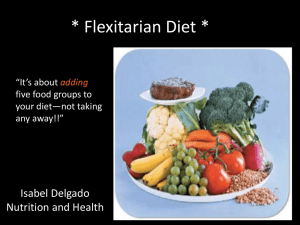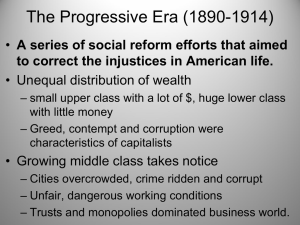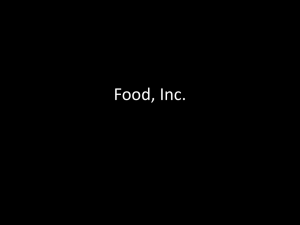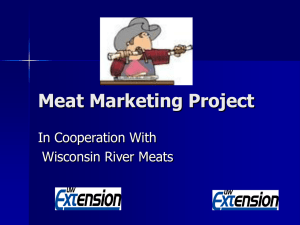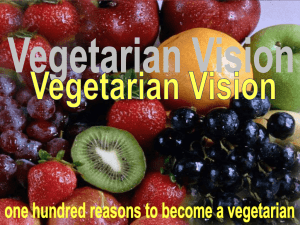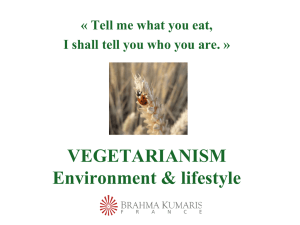what we can do to make eating less
advertisement
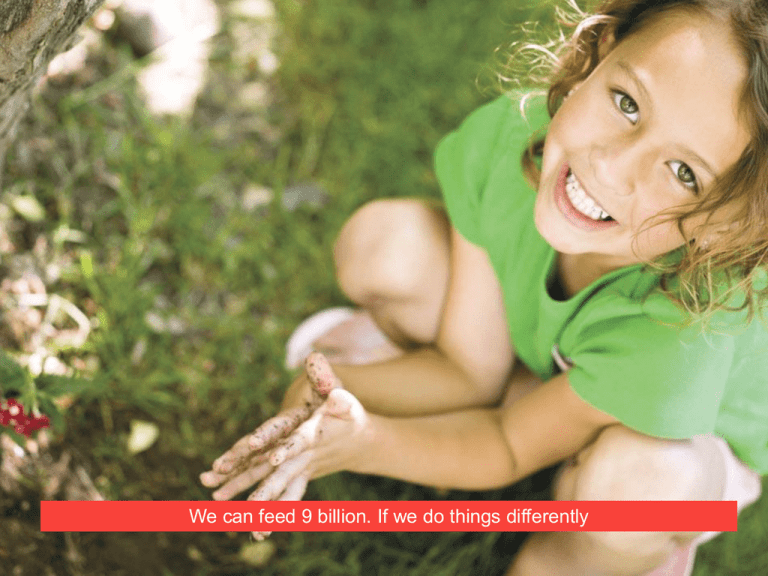
We can feed 9 billion. If we do things differently Big ideas for people, communities and local agencies - what we can do make eating less and better meat possible and fun Vicki Hird – Land Use, Food & Water Security Programme Twitter - @vickihird Key Considerations • • • • • The evidence is solid But depressing and alarming Make eating less and better the norm Make it ‘fun’ and ‘easy’ (to shop and cook) Make it irresistible and an attractive lifestyle or business or governance choice • And affordable. • And Part of a whole diet approach Part of a whole better diet Any push needs to be part of a sustainable diet? Ideally it would include the following: • More plants – go flexitarian • If you eat meat and dairy – eat less but better. Meat – red or white, should be a tasty complement to a fresh meal rather than the centre piece. • Waste less food – up to 30 per cent of the food we buy is thrown away. • Eat more fresh food, and reduce processed food • Eat food you can be sure of, such as goods that meet a credible certified standard – like MSC (Marine Stewardship Council certified label) fish or organic. As individuals, at home, in your community Tips as an individual Look at Eat Smart – several pages packed with ideas, recipes and tips such as • • • • Make more of your meat. Add grated vegetables, rice, lentils, barley, bran, breadcrumbs, oatmeal or beans to ground meat for a hearty meal. Bean there, done that - Flageolet, cannellini, haricot, kidney, black-eyed and butter beans make great alternatives to the traditional baked variety. Hold a recipe swap night – swap flexitarian + plant based recipes Buy in a co-operative -Set up a food co-op and promote eating less and better meat, and other ideas to members. Use the infographic and materials in the pack to show people some of the issues. Find out how at www.sustainweb.org/foodcoopstoolkit Communities Discuss what you would like to do as a group and individually to promote less&better. • What fits your group profile? How could promoting a better diet connect with your existing audience and even a wider set of people? • How can you start encouraging your supporters and wider community to eat better (or go ‘flexitarian’) – and what are the issues you need to consider? • How can you get wider interest in all your work through food related activities? Local promotions • • Run a public event with ‘what you like to eat’ as the topic. See if you could encourage local chefs to talk about how they could introduce a flexitarian option. You could distribute the recipes and information included here. Consider running a Low Carbon Cook-Off. They can be huge fun as well as informative. • Involve local farm shops and see if they will promote the infographic in their shop and give out the flexitarian recipes to customers. Would they chat to their customers about low meat recipes? Would they do the Pledge? • Use www.bigbarn.co.uk USE FUN FACTS and RECIPES Replacing 800g chicken with 250g chicken + 240g of tinned chickpeas saves greenhouse gas (GHG) emissions equal to making more than 580 cups of tea!!!! Influence local businesses Write to local stakeholders • Businesses, schools and hospitals need to hear that people care about sustainable diets • Having a meat-free or low-meat day, week or month would be a good way to promote the idea and show how easy it can be. You could ask local institutions to run one. • There is a letter in Eat Smart which you can adapt and send to local media and stakeholders. Campaigning and lobbying • write to your local newspaper about sustainable and flexitarian diets. • If you hold a meeting or event (like a Low Carbon Cook-Off) do invite your MP or other influential folk like councillors and canteen managers. • Design a pledge card and ask businesses and others to sign up • Get businesses interested – – Sodexo – the world’s leading food service company introduced Meatless Monday throughout its operations - 71% of sites said the campaign had made vegetarian options more appealing Run a low carbon cook off What is it? • a public event mimicking Ready Steady Cook: • two (or even more) teams cook a meal in a set time limit and the audience taste each dish and vote for a winner. • It’s used as a fun and engaging tool to talk about the environmental impact of what we eat – • You can discuss what are high/low carbon ingredients and tips to lower the impact of your favourite recipes. Ideas for partnership work • Have a flexi day where eating less and better meat is celebrated – be the first Flexitarian City – and announce it. Ghent have done a meat Free Monday; Lancaster City Council proposals; in 29 countries around the world have Meat Free Mondays. Part Time Carnivore for students. • Get an official acknowledgement (in local strategy, plans etc) that this is a key issue and that they have some responsibility – as the Oxford Foodprint report did. And what they could gain (for reduced local GHG, reduced obesity levels) • Develop - with the council or local food partnership -a set of Sustainable diet principles which acts as a baseline for their procurement and includes reference to the ‘hard’ elements like meat and fish • A mapping of city consumption – knowing how much needs to change and in what areas, communities, income groups ? so can start to assess the level of changes needed to work towards a more sustainable diet. That should include farming in periurban region and of local food initiatives and whether they actively promote a Sustainable diet. • Initiatives for local businesses – eg an event (or display, website) to introduce the Flexitarian concept to local shops, restaurants and what they can do to encourage more SD – eg talks about recipes, laminated cards, slide show, targeted education initiatives maybe. • Identify local champions – who can help promote. • Procurement FFL catering - Work towards a definite commitment to gold in as many catering establishments as possible (as Gold includes eating less meat) standard FFL catering • Tackling food waste – worst thing to waste is meat so encouraging less.. Get eating for the planet 4 hospital initiative • US Johns Hopkins School of Public Health ran a project in 4 hospitals to improve nutrition and benefitting the environment • Reduced meat purchasing by 20% within 12 months following introduction of a ‘Balanced Menu’, the pilot hospitals • reduced purchasing by an average of 28%, saving $400,000 on meat purchases in a year. Major GHG savings. http://www.jhsph.edu/research/centers-and-institutes/johns-hopkins-center-for-alivable-future/research/clf_publications/pub_rep_desc/balanced_menu.html Enter Get Gobby & Get Gobby Local http://www.foe.co.uk/page/get-gobby-2014 any student or group can apply – win £500/£750!! Thanks for listening and do get involved We have local groups, a forum (hub) and lots of actions to get involved with. @vickihird

